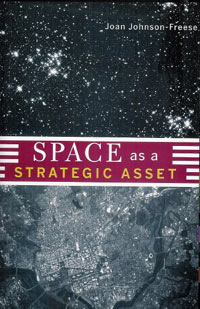Review: Space as a Strategic Assetby Eve Lichtgarn
|
| Johnson-Freese believes a robust manned space program is necessary for nurturing soft power internationally. |
The core problem with US space policy, she emphasizes, is America’s unrelenting militarization and weaponization of space. “While the rest of the world seeks to increase its ability to use space assets for information linkages required for economic growth in a globalized world, the United State sees much of the technology they are seeking as militarily sensitive and, consequently, is trying to stop its spread. That initial clash of ambitions is further exacerbated by the parallel emphasis the United States places on expanding its space superiority to space dominance.” Fear and national security issues have made the US inherently nervous about “dual-use” technology such as satellites, lasers, and GPS, which have military and civilian applications. Johnson-Freese points out that, initially, the US deliberately inserted timing errors into transmissions to downgrade the accuracy of nonmilitary GPS receivers with the intent of discouraging foreign military exploitation of the technology. However, the unintended result was to motivate foreign entities to develop their own GPS systems.
She makes a compelling argument that “through clumsy rather than intentionally nefarious use of its considerable power, the U.S. is perceived as a rogue nation in its own right. Other nations regard the U.S. as skirting international law in its treatment of war prisoners, lack of support for international treaties, and proclivity toward preemption and unilateralism. In the space arena, movement toward space weapons further reinforces this perception. The commitment of the U.S. to a regime in space based on legal premises and parameters would demonstrate its commitment to the rule of law at a time when that commitment is doubted, and when it is dearly needed to support U.S. efforts to spread democracy and principles of good governance.”
Johnson-Freese believes a robust manned space program is necessary for nurturing soft power internationally. “As long as the U.S. manned space vision is purely about exploration, its future is uncertain. As long as its future is uncertain, so too is American leadership in manned space. It is ours to lose. Other countries, particularly Russia and China, have manned space capabilities, and China offers another option to countries that already have experienced partnerships with the U.S. Letting go of its leadership in manned space might be tolerable under some circumstances, but not now. Currently, the U.S. is considering forfeiting an area that has long yielded soft power when soft power is most needed.” At the root of the dilemma is funding. We need only look back to our Moon project to see this. Johnson-Freese says clearly, “The lesson of Apollo is simple: without a strategic purpose, manned space flight is not deemed sufficiently important to warrant the kind of government resource investment necessary for success.” If a strategic purpose is a prerequisite, the resource investment is daunting. “The rule of thumb in calculating the cost of developing space technology—and this should be remembered later, when estimated costs for developing a new crew exploration vehicle (CEV) or missile defense are cited—is to take the high estimate, and double it.”
What, then, does the future hold? According to Johnson-Freese, the U.S. needs to regroup and consider several parameters, such as:
- Do not abrogate commitments on one international program to begin another.
- Establish realistic timelines.
- Develop the space exploration program to include other countries, not exclude them.
- Link the ISS and the space exploration program.
- Bring in partners early.
- Clarify and simplify the export control rules affecting dual-use technology.
She writes, “Developing a comprehensive space strategy for the U.S., one that would still stress space security but on a broader basis, would take rigorous analysis by people from many disciplines and areas of interest. This has not been done yet, and in some areas seems to have been deliberately avoided. It would also require the National Security Council; the Departments of Defense, State, and Commerce; NASA; other government organizations; aerospace industries; academia; advocacy groups; and others to work together. It would take real government leadership.”
Perhaps a good first step is to recommend reading this book.
